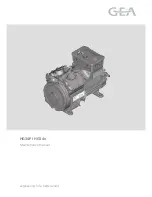
6
• Sprayed materials such as paint, paint solvents, paint
remover, insecticides, weed killers etc., contain harmful
vapours and poisons.
• Breathing compressor or sprayed materials vapor can
result in serious injury.
HOW TO PREVENT IT
• Never inhale air from the compressor, either directly or
from breathing device connected to the compressor.
Work in an area equipped with good cross ventilation.
• Read and follow the safety instructions provided on the
label or safety date sheet for the material you are
spraying.
Use an approved respirator designed for use with your
specific application.
WARNING:
Risk from Noise
WHAT CAN HAPPEN
The air compressor generates noise exceeding 80 dB (A)
during operation. It may cause the operator and people
around it to suffer hearing loss.
HOW TO PRIVENT IT
• Wear ear protection.
WARNING:
Risk from Compressed air
WHAT CAN HAPPEN
The compressed air stream can cause soft tissue
damage, and can propel dirt, chips, loose particles and
small objects at high speed, resulting in property damage
or personal injury.
HOW TO PRIVENT IT
• Always wear approved safety glasses with side shields
when using or maintaining the compressor.
• Never point any nozzle or sprayer toward any part of
the body or other people or animals.
• Always turn the compressor off and bleed pressure
from the air line before attempting maintenance,
attaching tools or accessories.
WARNING:
Risk from Moving Parts
WHAT CAN HAPPEN
The compressor cycles automatically when the switch is
in the on position. If you attempt repair or maintenance
while the compressor is operating or plug in, you can
expose yourself to moving parts. These moving parts can
cause serious injury.
HOW TO PRIVENT IT
• Always unplug the compressor and release air
pressure from the tank and any attachments before
attempting any maintenance.
• Never operate the compressor with guards or covers
which are damaged or removed.
• Keep your hair, clothing, and gloves away from moving
parts. Loose clothes, jewellery, or long hair can be
caught in moving parts.
• Air vents may cover moving parts and should be
avoided as well.
• Arrange for any repairs by MAKITA authorized dealer.
• Never put off the cover of the compressor except
MAKITA authorized dealer.
WARNING:
Risk of Burn
WARNING:
Do not operate the portable compressor
with the doors or enclosures open.
WHAT CAN HAPPEN
Contact with hot parts such as the compressor head or
outlet tubes could result in a serious skin burn.
HOW TO PRIVENT IT
• Never touch hot components during or immediately
after operation of the compressor. Do not reach around
protective shrouds or attempt maintenance until unit
has been allowed cool.
• The handling and lifting: hold the handle only when
move or transport the compressor. Do not move by
dragged.
• To avoid injuring, do not touch the cylinder, cylinder
head, exhaust hose or other over-headed parts and the
protector of control box of the lower part when the
compressor is in use or shuts off within one hour.
WARNING:
• Avoiding a place exposed to high
temperature or the direct sunshine, be sure
to use the machine in the well-ventilated
shade.
WHAT CAN HAPPEN
• Using it under high temperature or in the direct
sunshine not only deteriorate its durability, but increase
the temperature of main body, causing danger to your
safety.
HOW TO PRIVENT IT
• Be sure to use it in the well-ventilated shade. The
adequate room temperature is +5°C to +30°C (0°C to
+40°C at maximum).
WARNING:
• Never block a ventilation opening or use the
machine in a box or narrow place (in a
vehicle, etc.).
WHAT CAN HAPPEN
• Neglect of this may generate abnormal heat, causing a
trouble or accident.
HOW TO PRIVENT IT
• Install the compressor at the distance of 1m or more
from the wall to secure sufficient ventilation and
cooling.
WARNING:
• Never touch the air tank during operation of
the compressor.
WHAT CAN HAPPEN
• If the compressor is operated abnormally, the air tank
is heated and got high temperature.
WARNING:
Transport
a. Do not apply vehicles for traction.







































